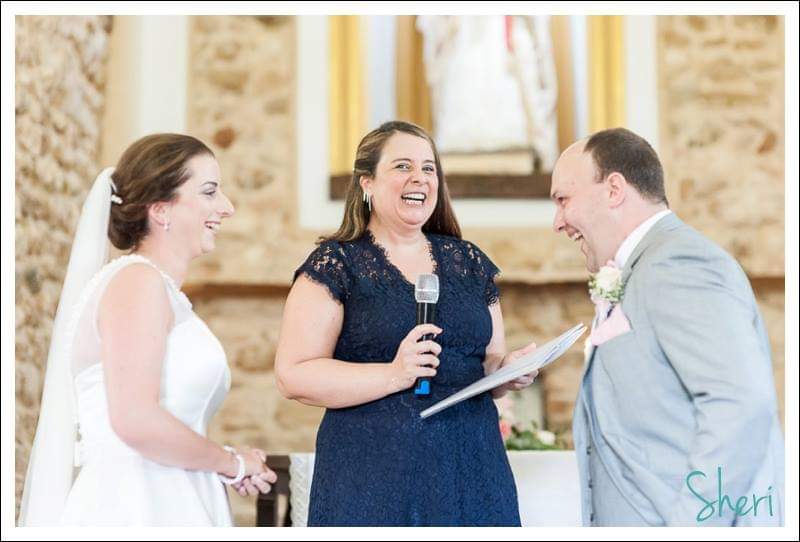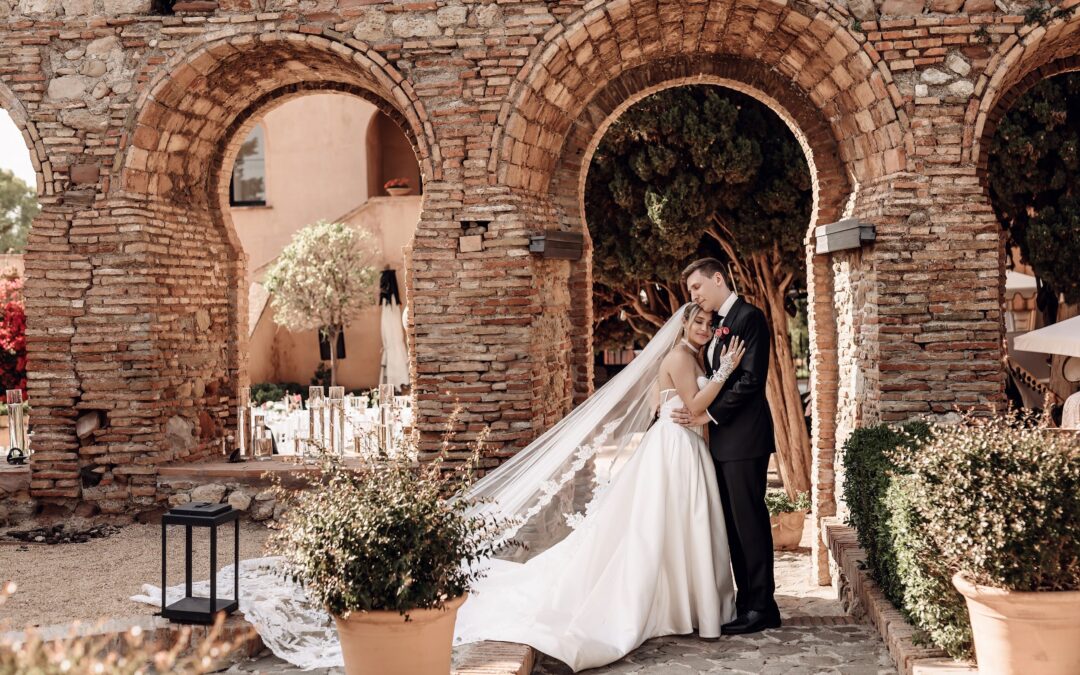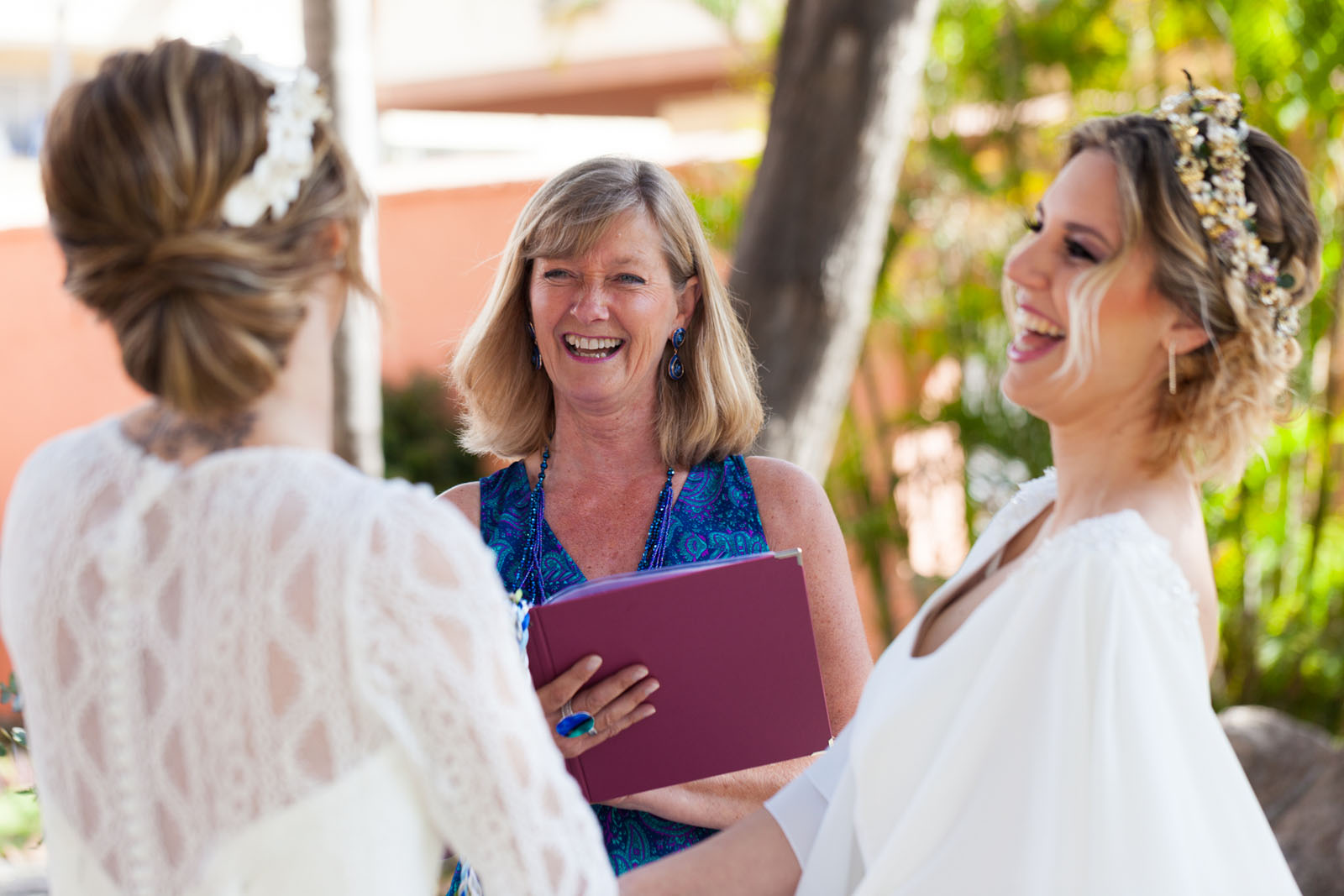Top 7 Things British Couples Should Know About Booking a Celebrant in Spain
If you are planning a destination wedding in Spain, you may already have looked into celebrants. Whilst couples can now use services like Wedissimo to find wedding celebrants in the UK, when it comes a to booking a celebrant for your destination wedding in Spain you’ll find some important differences. Below are seven key things you should know before you commit.

Nerja wedding with celebrant Debbie from the Celebrants in Spain team
1. Celebrant ceremonies are usually symbolic, not legally binding
In Spain a “celebrant” typically leads a personalised, symbolic ceremony. That means the celebrant does not perform your legal marriage. You will still need to complete a civil or religious ceremony that meets Spanish legal requirements (or at home) for your union to be legally recognised.
Many couples combine the celebrant ceremony with their vows and special touches, and handle the legal formalities separately (often before or after).

Malaga wedding with Marcia from the Celebrants in Spain team
2. Legal officiants in Spain are limited
Spanish law reserves legal marriage solemnisation to certain public authorities — for example mayors, judges or designated civil registry officials.Since 2015, notaries in Spain have also been authorised to conduct civil marriages, offering another route.
A celebrant cannot simply “upgrade” to a legal officiant unless they hold the required public authority. That distinction is important when you check contracts and confirm roles.

Madrid wedding with Lucy from the Celebrants in Spain team
3. Rules differ by region and municipality
Spain is decentralised in many matters, including marriage formalities. What applies in Andalusia may differ in Catalonia or Galicia. You must check with the local civil registry (registro civil) or town hall (ayuntamiento) in the specific municipality where you intend to marry.
Local offices may interpret required documents differently, or expect additional steps (for example for translation, apostille, identity checks). Don’t assume one region’s rules apply everywhere.

Barcelona wedding with Ximo from the Celebrants in Spain team
4. Documents need translation and apostille
Any foreign documents (birth certificate, certificate of no impediment, divorce decrees, etc) must typically be apostilled and translated by a sworn translator into Spanish.
You may also need to present a Certificado de Capacidad Matrimonial or similar certificate of capacity to marry, depending on your country’s rules and your local Spanish registry.
Start gathering and legalising these documents early — this process can take months.

Andalucia wedding with Karolina from the Celebrants in Spain team
5. Residency or nationality conditions may apply
Some Spanish regions require that one partner be a Spanish national or have valid residency for a number of years before a civil marriage is permitted.
If you do not meet those residency or nationality conditions, you might not be allowed to contract the legal marriage in Spain and would need to do that back in the UK (or in another jurisdiction) and then hold the symbolic ceremony in Spain.

Mijas wedding with Lenka from the Celebrants in Spain team
6. Fees, travel and scheduling flexibility vary
A professional celebrant in Spain typically charges for travel, officiating time, and custom ceremony drafting. Because celebrant services are private and not government-regulated, you will see variation in pricing.
You must also align schedules: legal registries are often open only on certain weekdays and hours. Your celebrant may be more flexible, but you’ll need both pieces to align in your planning.

Marbella wedding with Gema from the Celebrants in Spain team
7. Confirm what happens with paperwork and registration
Even for religious ceremonies, the officiant (priest, minister, etc) may or may not handle the civil registration for you.
You must check who will submit the completed legal paperwork to the Spanish civil registry or local authorities. If it’s not part of your celebrant’s service, you or your wedding planner must follow up.

Barcelona wedding with Jaume from the Celebrants inspain team
Final thoughts
Booking a celebrant in Spain is a wonderful way to have a meaningful, custom ceremony in your ideal location. But don’t forget: the celebrant is not a legal officiant in most cases. You must handle legal formalities separately, meet local document and venue rules, and coordinate between your celebrant and authorities.
Check your municipality early, start paperwork months ahead, and clarify roles and responsibilities. Do that and you can enjoy a beautiful, personal ceremony in Spain without unexpected surprises.

Alicante wedding with Chiara from the Celebrants in Spain team

Wedissimo.com
GUEST BLOG BY OUR LOVELY WEDDING FRIENDS AT WEDISSIMO.COM
Featured photo credit Gary Tapp Southern Spain and Gibraltar
(c) CelebrantSpain.es October 2025
This content was authored by Wedissimo and originally published on https://celebrantspain.es/blog/
Unauthorised publishing of the text or image content in part or in full is strictly forbidden.















